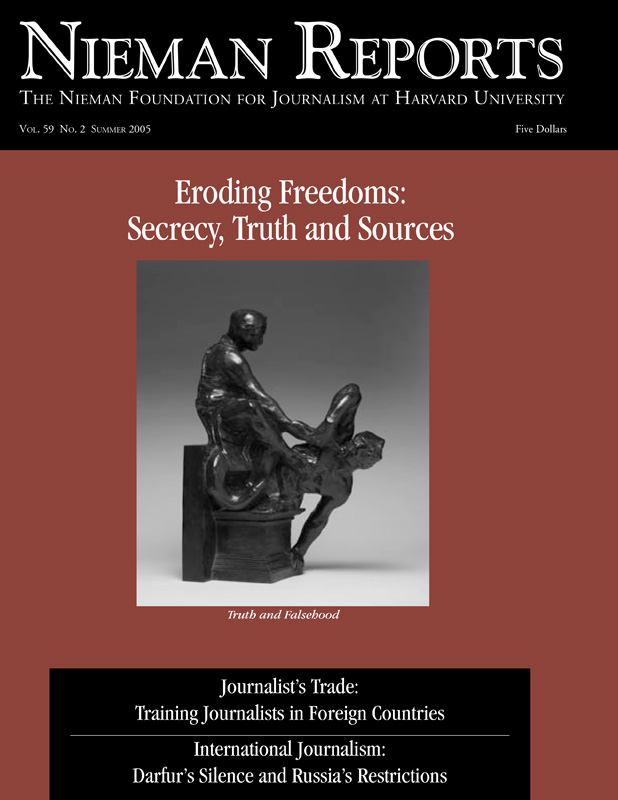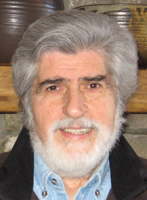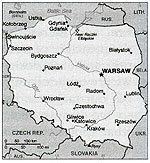After the 1989 collapse of Communism in Poland, I was in Warsaw planning training programs to assist journalists when a respected Polish journalist advised me not to just teach new skills but to change attitudes. For too many decades under totalitarian rule many journalists had been “reporting on their knees,” he told me. A similar situation was to be found throughout Central and Eastern Europe as Soviet bloc governments crumbled rapidly, and journalism was reinvented as part of the nations’ journeys toward democracy.
Teaching practical reporting and editing skills would be important, but what this person urged me to focus on was getting reporters to abandon their ingrained habit of printing official government releases unchallenged. They needed to learn tougher interviewing techniques and acquire the skills needed to do enterprise and investigative reporting. It would also be important for them to be shown how to create new laws to help secure the right to bring government information to citizens and to protect reporters’ confidential sources. They’d also need to establish protections against the harassing criminal libel and slander suits and develop tougher ethics codes to restore public trust in the news media.
There had been decades of official censorship during Poland’s period of martial law and self-censorship by journalists during quieter times. This was the environment into which students of journalism in the past had emerged from schools that too often were little more than propaganda training mills. Compliant “nomenklatura,” handpicked by the Communist party to run the news media or the journalism schools, had left a rank odor in much of the Soviet bloc’s media. Broadcasting—tightly controlled by governments in the region—had to be overhauled with an infusion of newly licensed independent stations.
In time, Polish journalists did scrap regulations such as the Law of Authorization, which required reporters to submit copy to quoted sources to get signed authorization before publishing or broadcasting the quotes. In this process accurate quotes could be censored by officials with squeamish, second thoughts about what they had said. (It surprised us to learn that some meeker journalists supported this law because it put the onus of accuracy on the source and gave the journalists protection against libel actions. Fortunately, many others opposed or ignored the regulations, and the restrictions collapsed.)
Adapting to Cultural Differences
For Americans to teach journalism successfully in other countries requires them to step back and challenge their own assumptions about journalism training rather than attempt to retrofit a particular curricula. Instead what is taught must be tailored to the external circumstances involved with fragile emergent economies and transitional democracies.
For us, in Poland, this meant not rushing in with grand schemes to “train” journalists in our image, but spending many days in informational visits with journalists and educators. We listened and jointly assessed the needs, agreed upon short- and long-term plans, and recruited indigenous journalists and educators to be actively involved in the training and to assume leadership roles in teaching. Key among our goals was the hope that we could train others as trainers and thereby institutionalize our efforts. Everyone, we agreed, must commit to this for the long haul and not just sponsor episodic events.
The collapse of Communism opened the floodgates to an outpouring of journalism training, seminars, workshops, exchange visits, fellowships, brand new or retooled university journalism education. It was unparalleled, the equivalent after the cold war of a Marshall Media Assistance plan for newspapers, television, radio and magazines, and university journalism education.
RELATED ARTICLE
“Strategies for Training International Journalists”
– Jerome AumenteWhat we learned from our experience in Poland—and what hundreds of other journalists and foundations supporting their training efforts abroad have learned from working in similar situations—has important implications as the climate for independent news media improves with governmental changes being brought about through wars, revolution or electoral transition. Coupled with the communication and information-swapping tools of the Internet and the newer multimedia environment, it’s an opportune time to learn from our successes and from our mistakes, as more opportunities for such training open up in Arab and Islamic nations, as well as in Asia and Africa. And there remains a need for training in some parts of Europe, despite some funders’ mistaken assumption to the contrary.
Experiences in Training Journalists
Training of journalists began for me in 1979 when thousands of them came to Rutgers University’s Journalism Resources Institute, which I founded and directed until I retired as professor emeritus from the School of Communication, Information and Library Studies in 2000. Still I remain involved with overseas training programs for journalists and assist universities seeking to modernize their journalism curricula.
In 1989 the U.S. Information Agency in Washington, D.C. asked me to assist nations emerging from Communist rule in Europe with training of journalists, and that is how I came to work in Poland soon after the election of Solidarity. Since then I’ve taken nearly 100 overseas training or assessment trips to Poland, Russia, Slovakia, the Czech Republic, Hungary, Bosnia and Herzegovina, Croatia, Macedonia and Serbia, as well as in Latin America and Western Europe. Now I develop and direct programs in partnership with Arab journalists from seven countries whose work in the United States is supported by the Meridian International Center in Washington, D.C.
It’s been fascinating to track the evolution of these efforts. At first, in Central and Eastern Europe, there was the need for immediate, short-term workshops for print and broadcast media. To respond, we assembled teams of American journalists and educators to crisscross countries to conduct workshops. When more permanent support followed, media resource and training centers were established by various organizations in major capitals, such as Warsaw, Prague and Budapest. Linkages with U.S. universities followed as old restraints fell aside. Stagnant educational ponds were refreshed, curriculum modernized, facilities upgraded, and better linkages were forged with professional journalists. Fellowship programs increased opportunities for foreign journalists to come to the United States, and this gave European journalists closer exposure to American news media and universities.
RELATED ARTICLE
“Support for International Journalism Training”
– Jerome AumenteIt is expensive to run ongoing training programs, but the foundations and government sources help. The opportunity to work overseas in international journalism programs is a special privilege and very different from the benign atmosphere of the more affluent American universities and news media. Issues of press freedom and independence are drawn in vivid real-life examples that burn into your consciousness and touch your heart. Once they do, there is no way to underestimate the value of our First Amendment freedoms.
Reporting in the Resistance
I think of a journalist friend in Krakow, Poland who helped create a university student radio station that evolved from a cable radio dormitory service into a nationally licensed public radio station with hundreds of thousands of listeners. As we walked along a street, she recalled when, as a graduate student during martial law, she pushed a baby carriage with her infant son sitting atop a pile of hidden, freshly printed underground newspapers, until one day she was caught by the police. (She was released from police custody and was not deterred from remaining active in the underground opposition.)
Another excellent newspaper reporter told of working for underground newspapers and using her advanced pregnancy to distract secret police attention from the mimeograph machine provided by a European labor union that she helped smuggle from Warsaw to Krakow. Another journalist who has worked with me in many projects casually pointed to the jail where he was held for demonstrating against censorship. Upon release he chose to work as an orderly in a mental hospital until a free press could be restored. A dean of a journalism school in Prague told me he became a window washer while he waited for Communism to fall. And there is the woman who directed the journalism program at the University of Sarajevo who bravely pedaled her bicycle through sniper alley every day to reach her classes during the Bosnian war. Teaching in basement classrooms pockmarked with mortar shells, she never missed her classes and burned furniture in a wood stove to heat the frozen classroom.
In this line of work it is common to meet journalists who’ve been jailed or had begun their reporting careers by working for one of the hundreds of underground “samizdat” newspapers, some of which became over-ground successes, such as Poland’s “Gazeta Wyborcza” (Election Gazette), now one of that country’s preeminent newspapers. Among my mementos from my many trips are tiny, meticulously printed banned books that fit in the palm of my hand, given by those who published them in underground presses. Secret libraries in homes allowed many to share these clandestine publications. And so-called “flying” universities flourished underground when journalists weren’t free to teach.
Young journalists from this era of resistance worked with us during our early years in Poland when we argued intensively over what constitutes objectivity or why journalists should give equal attention to all sides of an issue, even when this meant reporting fairly on politicians from discredited regimes who sought rebirth in a transitional democratic society. A tendency to mix polemical attacks with reporting—an instinct of their underground reporting— took years to strip away. We worked with editors to help devise ethical codes based on their culture and conditions and on ways to draft laws for greater access to government information.
Changing Habits, Facing Dangers
We heard journalists describe how newsroom colleagues now sitting next to them as rehabilitated coworkers once acted as government collaborators and worked with them on ways to establish trust. A radio reporter disdainfully talked of a broadcast colleague who, during the martial law takeover in Poland, collaborated—saying he could almost “hear him” in military uniform as he delivered censored news.
In Serbia, just before President Slobodan Milosevic was removed from office, we did a series of workshops throughout the country for independent radio and local television stations that were steadily being closed down due to their opposition to his regime. The owner of one station in Niš had to flee the country not long after we left: He ended up a refugee in the United States and was helped by us and a number of American journalistic organizations.
During the late 1990’s, an editor and publisher from Banja Luka in Bosnia I had worked with during one of our many seminars in the United States did an investigative exposé of Bosnian Serb war crimes. Two days before our scheduled reunion in Bosnia, he lost both legs in a car bomb explosion aimed at his reporting. Within weeks he was in a wheelchair at meetings urging young journalists not be scared off by his attack. Later, we helped get him financial assistance for prosthetics and rehabilitation. He was subsequently honored by the Committee to Protect Journalists at its global awards ceremony and has continued to send staff to our programs.
The complications and dangers faced by journalists unfortunately continue to this day. Arab journalists I am now working with tell me stories of censorship. One told of being forced to flee Iraq when he spoke out against a repressive regime. Others share stories of their fathers and uncles being killed in sectarian fighting in the Middle East. Not only do we have the opportunity to offer these reporters training, but also from them we learn much about the dangers many of them face as they try to uncover stories of
Jerome Aumente, a 1968 Nieman Fellow, is distinguished professor emeritus and special counselor to the dean of the School of Communication, Information and Library Studies, Rutgers, the State University of New Jersey. His projects include Russia, Macedonia, the training of Arab journalists, and a book on the history of New Jersey newspapers.




